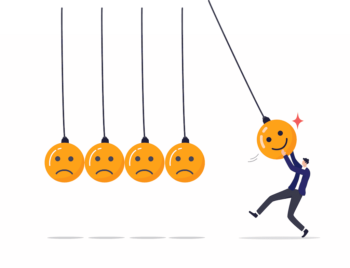Home / Health & Wellness Articles /
Understanding Toxic Positivity

Having an optimistic outlook on life can significantly impact our mental health for the better. However, we can actually experience too much positivity, to the point that it becomes toxic. It’s good to be able to see the silver lining through the storm clouds in life, but it’s also important to acknowledge that those storm clouds do exist. So, what is toxic positivity?
Toxic positivity occurs when an individual or group discredits one’s ability to express negative emotions. People who show signs of toxic positivity tend to avoid emotions that they consider negative or unpleasant, such as anger or fear. Or, when they do experience a negative emotion, they may feel guilty for doing so. In turn, people who engage in toxic positivity tend to dismiss and suppress the unpleasant feelings of others, because they may have difficulty working through them.
Expressing thoughts and feelings of genuine gratitude and positivity can sometimes shift to different degrees of toxic positivity. This can happen when there is no acknowledgement or acceptance of one’s own hardships and struggles. “At its core, toxic positivity is a way for people to cope with things that they aren’t ready, willing, or able to face,” says Emily Brault, Licensed Clinical Social Worker at Centerstone. Ignoring the fact that negative emotions exist can be a defense mechanism to avoid unpleasant feelings.
A potential consequence of engaging in toxic positivity is that it can cause strain in relationships. If friends and family feel like they are not being heard, or are being dismissed, they may avoid approaching that person for support.
Because toxic positivity is usually a subconscious reaction, it may be beneficial for friends and loved ones to bring attention to this behavior. “Those who engage in toxic positivity may benefit from a level of accountability through self-reflection and check-ins with others in their lives, as well as with themselves,” adds Brault. This could be as simple as an internal self-check about your energy levels, mood, and stressors that may be impacting your ability to truly connect with those in your life. Those who are ready, willing, and able to manage their toxic positivity, should be able to acknowledge where their toxic positivity comes from, and why they may be engaging in this behavior. In doing this, they can discover the root of the behavior and develop strategies for checking, challenging, and changing the behavior and understand the impact has on themselves and people in their life.
Facing unpleasant emotions can be daunting, and isn’t always easy to manage. However, Centerstone can help. Call us at 877-HOPE123 (1-877-467-3123) or visit our counseling services page to learn more.
